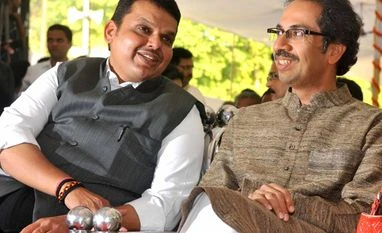When Maharashtra Finance Minister Sudhir Mungantiwar was presenting the Budget on March 18, Bharatiya Janata Party’s (BJP)’s ally Shiv Sena had organised a bandh at Girgaum in south Mumbai.
They were protesting against the Colaba-Bandra-Seepz Metro III project, which will pass through the area, dominated by Marathi-speaking people. Shiv Sena attacked the government — of which they are a part — and Chief Minister Devendra Fadnavis, while turning down its proposal for rehabilitating 777 families from chawls (communal tenements) to larger houses in the same locality.
The Shiv Sena also attacked Mungantiwar for not setting aside funds for a number of infrastructure projects for Mumbai.
After a bitter fall out and an acrimonious election campaign, Shiv Sena had joined BJP’s minority government on December 5 last year.
But they have remained stringent critics, taking potshots at the government and at BJP at every opportunity, over issues such as farmers suicides, deteriorating law and order, BJP’s debacle in the Delhi Assembly polls and its decision to form the government with People’s Democratic Party (PDP) in Jammu and Kashmir.
Last week, Shiv Sena slammed the BJP for backing the no-confidence motion against Legislative Council Chairman Shivajirao Deshmukh.
BJP leader Eknath Khadse defended his party’s decision saying it would support any move rid Maharashtra of the last vestige of the erstwhile Congress rule. BJP also managed to outmanoeuvre Shiv Sena by getting it to withdraw its nominee from the election to the Council chairman, clearing the way for the unanimous election of Nationalist Congress Party senior leader Ramraje Nimbalkar.
The quagmire of contemporary politics in Maharashtra as been described as a Bollywood-style love-hate triangle by political analyst and senior editor Kumar Ketkar.
“It is a pati, patni aur woh (husband, wife and the other one) with BJP playing the pati, Shiv Sena the nagging patni, and NCP the promiscuous and seductive woh. It is not the Theatre of the Absurd but a hilarious farce.”
(Theatre of the Absurd was a post-Word War II avant-garde movement that began in Paris with Samuel Beckett, Eugene Ionesco and Jean Genet, and was also an influence for Marathi playwright Vijay Tendulkar.)
The verbal duel is likely to continue till the BrihanMumbai Municipal Corporation, slated for February 2017. The allies are in power in the richest municipal corporation in the country for the past two decades.
But buoyed by its stellar performance in Maharashtra, the BJP has set its eyes on the seat of the mayor. Shiv Sena, too, has padded up to retain its upper hand by appealing to the Marathi sentiment.
The Punch and Judy routine has found other venues, too.
Shiv Sena abstained from voting on the Land Acquisition Bill in the Parliament, claiming it wouldn’t support a law “against” farmers. BJP retaliated by shooting down Shiv Sena’s proposal to allow rooftop restaurants in Mumbai.
Shiv Sena chief Uddhav Thackeray returned the volley by dismissing the draft development plan for Mumbai, suggesting floor space index hike. He said he would throw the plan away if it did not provide cheaper homes.
Sources claim while the Sena leaves no opportunity to remind the BJP that it joined the government only for the sake of Maharashtra, the latter, too, would gladly take the NCP on board if the Shiv Sena decides to file for divorce.
While the administration rumbles along, Ketkar said: “The theatre-loving people of Maharashtra are being treated to quite a show on the political stage, alebit at the cost of governance.”
Top Section
Explore Business Standard
)